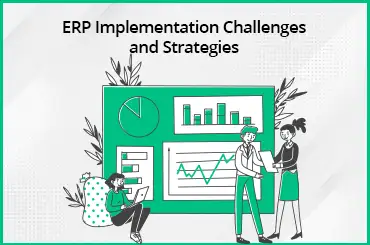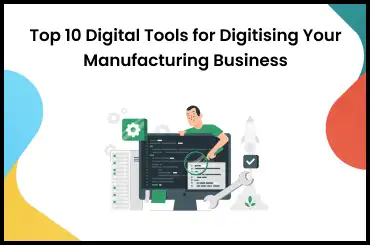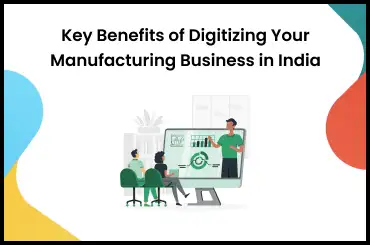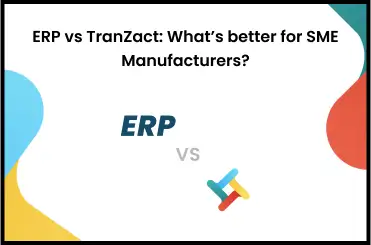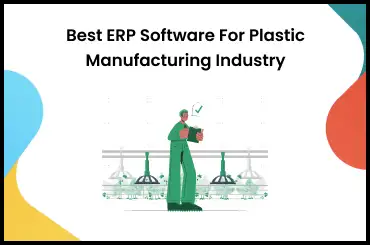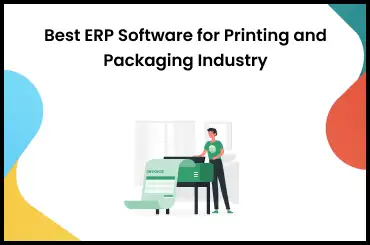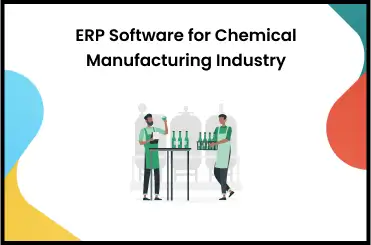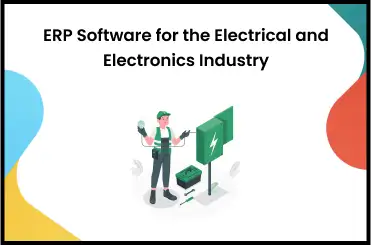ERP for project management offers comprehensive tools and features to effectively plan, track, and manage projects, ensuring efficient resource allocation, streamlined workflows, and successful project outcomes.
Do you want to install enterprise resource planning software for project management but you're worried about costs, delays, and the potential impact on your business processes? We have all heard the horror stories of ERP packages that were badly executed and took years to yield a return on investment if they ever did.
The key question is what can be done to mitigate these threats. This article will help you learn the meaning of ERP for project management, the phases of ERP project management, and the role of the ERP implementation project manager. This will support your business in mapping a way forward to deal with the challenges of ERP project management.
ERP Project Management: What Is It?
ERP stands for "enterprise resource planning a type of business software used to oversee crucial functions like finances and human resources. With the use of ERP project management software upper-level management may access a centralized database containing up-to-the-minute data. They can experience higher levels of effectiveness, productivity, and work satisfaction as a result of being able to do routine activities more rapidly. By having access to the whole picture at all times, ERP for project management empowers managers to make sound decisions based on reliable data. They will also have the ability to quickly provide meaningful reports. With everyone in the firm seeing the same data, processes are more streamlined.
With features such as a material management module in ERP for project handling, businesses can streamline inventory and production operations with ease.
Phases of ERP Project Management: What You Need to Know
Understanding the ERP project management phases is a crucial first step in modernizing your business's software. Let's go through these steps one by one:
Establish the Project
This is essentially the preparatory action taken before beginning anything. The CEO's signature on a contract to buy new software or a project's approval email to the CFO are both examples of this.
Initiation
There is now a well-structured ERP implementation team that has begun data collection. Perhaps the contract negotiator is aware of the specific pieces of software that were acquired, but what if no one else is? Right now is when you need to compile all of that data.
Assess What You Require
Assess and analyze to determine what features are essential in the new program. Just what precise needs do you have? At the conclusion of this stage of ERP for project management, a requirements document is created and approved by top management to affirm the expectations for the ERP rollout.
Create or Purchase the New Programme
Software designers can go to work now that they have a good idea of what needs to be built. Having open lines of communication is essential at this stage. On the other hand, you may purchase a ready-to-use and customized ERP software for project management.
Implement It
During configuration, experts in the new software begin tailoring it to your organization's unique needs. This stage may coexist with the design stage of the project management plan for ERP implementation.
Testing for Acceptance by Users
User Acceptance Testing (UAT) is an integral part of every successful ERP rollout. It's crucial to recruit specialists in the field who will be utilizing the software in question as testers. Testers will have to verify that the updated software performs as expected. If an inexperienced user approves software without the necessary functionality, your business might lose time and money down the line.
Why Should You Use ERP Project Management?
ERP has several advantages. The benefits of an enterprise resource planning (ERP) system include process optimization, improved departmental collaboration, and enhanced customer relationships.
Some of the most compelling arguments in favor of ERP include the following.
Enhanced Productivity
The ability to automate mundane tasks is a major benefit of enterprise resource planning systems. This allows workers to focus on activities that directly affect revenue and helps to standardize routine corporate procedures.
Improved demand forecasting with fewer manufacturing interruptions, faster delivery timelines, and a more efficient supply chain are only a few of the key benefits of an ERP for project management companies.
Integrated Regulations
An underrated benefit of the best ERP for project management is its capacity to aid in monitoring regulatory and compliance developments. Compliance with regulations is essential to the success of any organization.
Cloud-Based Availability
Although traditionally enterprise resource planning (ERP) systems were offered as on-premise solutions, cloud-based ERP software has gained popularity in recent years. The main advantages of cloud ERP are that it frees up IT resources, provides more reliable data security, and allows for more portability.
When an ERP system is hosted in the cloud, users may log in from any location with an internet connection using any device. This facilitates rapid response without necessitating physical proximity between team members.
Superior Assistance to Clients
Having all client information in one place allows for more efficient communication and collaboration between departments, leading to quicker responses, more precise deliveries, and fewer mistakes in customer orders. Instead of spending time updating spreadsheets, salespeople and marketers can concentrate on developing functional leads for project planning and management.
Enhanced Cooperation
The connectivity provided by ERP systems boosts team communication and participation. Every authorized worker may view operational data whenever they need it thanks to the company's enterprise resource planning (ERP) system. Workflow improvements and savings may be attributed, in part, to the elimination of unnecessary silos and the constant dissemination of project information.
Improved Reporting with Real-Time Information
ERP's strength as a central repository for information is one of its primary advantages. With the ability to store and analyze data from all of your activities in one place, an ERP for project management gives you access to the whole picture and the confidence to make strategic decisions. With all of this information in one place, businesses can get better, more timely reports.
Flexibility
Ease of use and flexibility are features of modern ERP systems that are favored by many users. Applications with a modular design can be utilized independently or as part of a larger package. Rather than paying for software that it won't use, a corporation may pick and select the programs that work best for them. Because of this adaptability, companies may finally upgrade from their outdated, inefficient systems.
The Role of an ERP Implementation Project Manager
The role of an ERP implementation project manager is to oversee and coordinate all aspects of the ERP implementation process, including planning, organizing, and leading the project team. They ensure timely and successful implementation by managing resources, mitigating risks, and facilitating effective communication among stakeholders.
Who Is the Right Person for ERP Project Management?
While familiarity with company procedures is beneficial, it is not necessary. Having no prior experience in the field might be advantageous in certain situations.
The ideal candidate for ERP project management is someone who is well-organized and has good delegation skills. Another important skill is the ability to build agreement among stakeholders on key business process challenges, regardless of their prior experience or education.
Successful Project Manager Characteristics
The following characteristics support the role of a successful ERP project manager:
- Strong leadership skills: A successful project manager should be able to inspire and motivate their team, set clear goals, and make effective decisions.
- Excellent communication: They should possess exceptional communication skills to effectively convey project requirements, expectations, and updates to team members and stakeholders.
- Effective time management: They should have strong time management skills to prioritize tasks, manage deadlines, and ensure timely project delivery.
- Problem-solving abilities: They should be skilled in identifying and addressing project challenges and finding innovative solutions.
ERP Project Management Is Key to a Successful Implementation
Effective ERP project management plays a crucial role in ensuring a successful implementation. A successful implementation that maximizes value for your organization may be achieved by adhering to best practices of ERP project management, from requirement formulation through support.
It involves the planning, coordination, and execution of various project activities, including requirement gathering, system configuration, testing, training, and deployment. TranZact offers intuitive and easy-to-use ERP solutions, especially for SME manufacturing business owners. It automates and enhances everyday operations enabling businesses to save time and resources.
FAQs on ERP for Project Management
1. What is the scope of the ERP project manager?
The ERP project manager is in charge of developing and maintaining a detailed project plan that specifies the goals, timeline, budget, and resources for the ERP project.
2. What is ERP project implementation?
ERP project implementation refers to the process of planning, executing, and integrating an enterprise resource planning (ERP) system into an organization's existing infrastructure. The aim is to improve business processes, data management, and overall operational efficiency.
3. What are some of ERP's advantages to project management?
Project expenses may be centralized in ERP systems by assigning each one a unique production job number. All project expenses may be tracked in one place, including worker hours, subcontractor and material prices, and purchase orders.
4. What does the Project Management Office do for an ERP rollout?
The PMO (Project Management Office) is in charge of overseeing the project's budget and strategy for putting it into action. An executive steering group will be the PMO's immediate superior. The PMO is accountable to the project team, which includes the customer and the vendor.
5. What makes a good ERP system better?
Better vendor support is a hallmark of a high-quality enterprise resource planning (ERP) system. Training, documentation, and virtual assistance, and upkeep and repair services are all part of the package.
6. What is project preparation in ERP?
The ERP software selection process begins with the project planning and preparation phase. To begin the software selection process, businesses must first determine the business drivers and executive sponsors who will be responsible for launching the initiative.
7. Can ERP be used for project management?
Yes, ERP systems can be used for project management by providing tools and functionalities to effectively plan, track, and manage various aspects of projects. These include resource allocation, task scheduling, budgeting, and collaboration.








